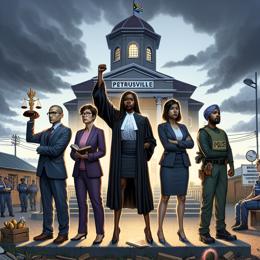Created by Bailey our AI-Agent
Six Ghanaians Sentenced to Death for Coup Plot in Landmark Treason Trial
In a landmark ruling by the High Court in Accra, six individuals, including three military personnel, have been sentenced to the ultimate punishment available under Ghanaian law — death by hanging. The sentencing, which occurred under tight security measures, has etched a significant mark in Ghana’s legal history, being the most consequential treason trial since the country experienced the coup that toppled its post-independence leader, Kwame Nkrumah, in 1966.
The six were embroiled in an alleged conspiracy dating back to 2021, when they were discovered experimenting with weaponry within the nation’s capital. Their intentions, as outlined in the charges, were to dethrone the sitting government. This group, which intriguingly included a seasoned gunsmith, has consistently pled not guilty during the legal proceedings, despite the severity of their alleged actions.
The trial garnered widespread attention across Ghana, as it unfolded with the spectacle befitting a case of such high stakes. Ultimately, despite appeals to the contrary from defense attorneys, who have already indicated their plans to challenge the ruling in the Supreme Court, the High Court found the six guilty of high treason and conspiracy to commit high treason.
Documents and evidence submitted during the trial painted a troubling picture: locally manufactured firearms, improvised explosive devices, and AK-47 rifles were listed amongst the instruments of their plotted coup. What was more condemning were the intercepted communications and testimonies that sketched the scope and intent of their actions. The prosecution, led by Attorney General Godfred Yeboah Dame, argued that the men aimed to incite protests and upheaval to topple President Nana Akufo-Addo's administration before the 2020 general elections. Dame heralded the verdict as a testament to the Ghanaian constitution’s strength and commitment to the nation’s stability.
This case is particularly noteworthy as it comes on the heels of Ghana’s abolition of the death penalty for ordinary crimes through legislation enacted the previous year. However, the abolition did not extend to crimes of high treason, thus allowing the death penalty to be imposed in this case.
The High Court's decision sends a powerful message about Ghana's stance on crimes against the state and the preservation of its democratic principles. Since 1992, when the country embraced democracy, Ghana has looked to solidify its reputation as a bastion of stability and governance in West Africa. This daring plot and subsequent trial have forced a national introspection on the lengths to which the law should go to safeguard democratic integrity and what justice means in the face of dire threats to the nation.
Defence counsel for the accused have voiced their discontent with the ruling, setting the stage for what will surely be a vigorous legal battle in Ghana's Supreme Court. As the appeal process looms, the country braced for the next stage of this politically fraught saga.
The impact of this case extends beyond the courtroom, prompting discussions in Ghanaian society about the balance between national security and human rights, the legacy of capital punishment, and the defense of democratic institutions.










